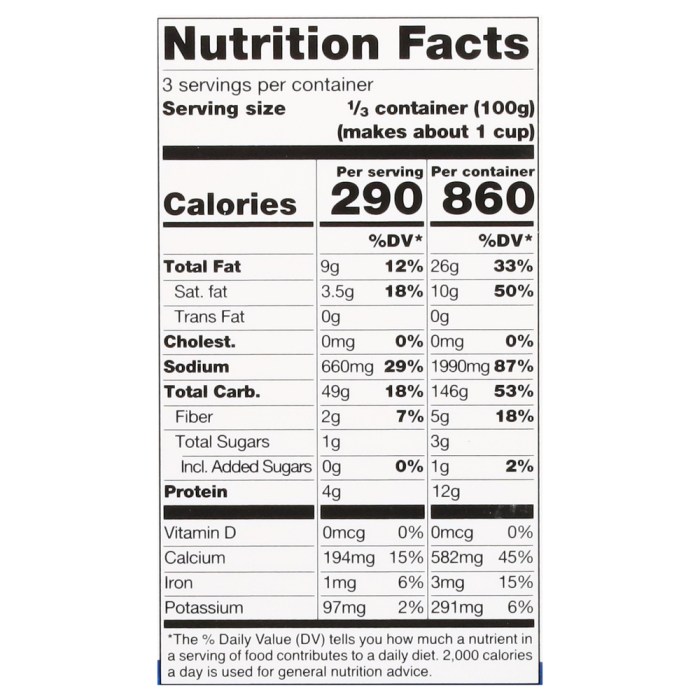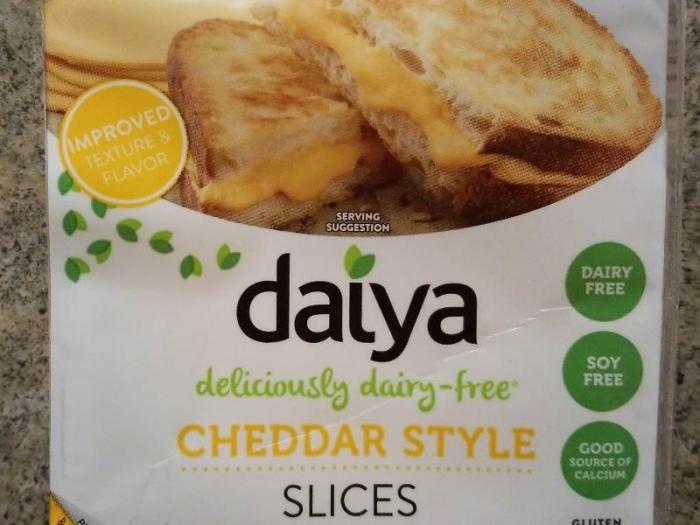Comparison with Traditional Cheese

Daiya cheese nutrition facts – Daiya cheese, a vegan alternative, presents a compelling case study in the evolution of food technology. Its nutritional profile differs significantly from traditional cheeses, prompting a closer examination of its suitability as a substitute. Understanding these differences is crucial for consumers making informed dietary choices.
A direct comparison reveals striking contrasts between Daiya and traditional cheeses like cheddar and mozzarella. While Daiya aims to replicate the taste and texture, its underlying nutritional composition diverges considerably.
Understanding Daiya cheese nutrition facts is crucial for those watching their intake. However, if you’re considering the cheese within a pizza context, comparing the nutritional profile to a standard slice is helpful. For a detailed breakdown of a typical slice, check out this resource on slice of cheese pizza nutrition facts to better understand how Daiya stacks up against traditional cheese in a pizza setting.
Returning to Daiya, remember to always check the specific nutritional information on the packaging.
Nutritional Profile Differences
The following points highlight key discrepancies in the macronutrient composition between Daiya and traditional cheeses. These differences are important to consider for those managing calorie intake, fat consumption, or protein needs.
- Fat Content: Daiya is significantly lower in total fat compared to cheddar and mozzarella. This reduction is largely attributed to the absence of animal-derived fats.
- Saturated Fat: Traditional cheeses are relatively high in saturated fat, a type of fat linked to elevated cholesterol levels. Daiya contains considerably less saturated fat, making it a potentially healthier choice for individuals concerned about cardiovascular health. For instance, a serving of cheddar might contain 8g of saturated fat, while a comparable serving of Daiya may contain only 1g.
- Unsaturated Fat: While Daiya is lower in overall fat, the types of fats present differ. Traditional cheeses contain a mix of saturated and unsaturated fats, whereas Daiya’s unsaturated fat content is higher proportionally. However, the absolute amount of unsaturated fat is still generally lower than in many traditional cheeses.
- Protein Content: Daiya’s protein content is lower than that of most traditional cheeses. While it provides some protein from its plant-based ingredients, the amount is not equivalent to the protein found in animal-based cheeses. A serving of cheddar might offer 7g of protein, whereas a comparable serving of Daiya might only contain 3g.
- Protein Quality: The type of protein also differs. Traditional cheeses provide a complete protein source, containing all essential amino acids. Daiya, being plant-based, may lack some essential amino acids, although this can often be compensated for through a varied diet.
Fat Content: Saturated and Unsaturated Fats, Daiya cheese nutrition facts
The difference in fat content between Daiya and traditional cheese is particularly noteworthy. The type of fat is as crucial as the amount. Traditional cheeses, especially full-fat varieties, are rich in saturated fat. Conversely, Daiya, while containing less total fat, offers a higher proportion of unsaturated fats, which are generally considered healthier for the heart. This shift in fat profile contributes to the overall difference in the nutritional value of these two cheese types.
Protein Content and Quality
Protein is another area where Daiya and traditional cheeses diverge. Traditional cheeses are excellent sources of high-quality protein, providing all the essential amino acids necessary for building and repairing tissues. Daiya, while providing protein from sources like soy or pea protein, offers a lower quantity and may not provide a complete protein profile. This difference in both quantity and quality is significant for individuals with high protein requirements, such as athletes or those following specific dietary plans.
Daiya Cheese Ingredients and Allergens: Daiya Cheese Nutrition Facts

Daiya cheese, a popular vegan cheese alternative, boasts a complex composition designed to mimic the texture and flavor profile of traditional dairy cheese. Understanding its ingredients and potential allergens is crucial for consumers with dietary restrictions or sensitivities. This section delves into the typical components of Daiya cheese and highlights potential allergens to aid informed decision-making.
The precise ingredient list can vary slightly depending on the specific Daiya cheese flavor, but the core components remain consistent across their product line. These ingredients work synergistically to create the final product’s unique characteristics.
Daiya Cheese Ingredients
The following list represents a typical compilation of ingredients found in various Daiya cheese products. Note that minor variations may occur based on the specific flavor profile.
- Filtered Water: Forms the base of the cheese, providing a creamy texture.
- Nutritional Yeast: A key ingredient contributing to the cheesy flavor and nutritional value.
- Tapioca Starch/Modified Food Starch: Acts as a thickener and contributes to the melt and stretch characteristics.
- Coconut Oil: Adds richness and contributes to the creamy texture.
- Potato Protein: Provides structure and contributes to the overall texture.
- Pea Protein: Another protein source contributing to texture and mouthfeel.
- Fava Bean Protein: Contributes to the overall protein content and texture.
- Sea Salt: Enhances the flavor profile.
- Natural Flavors: A blend of flavor compounds designed to mimic the taste of dairy cheese.
- Other Ingredients (Flavor-Specific): Depending on the flavor, additional ingredients like vegetable oils, fruit extracts, or spices may be included.
Common Allergens in Daiya Cheese
While Daiya cheese is marketed as vegan and dairy-free, it’s essential to be aware of potential allergens present in the ingredients. Consumers with severe allergies should carefully examine the specific product label for the most up-to-date information.
- Soy: Some Daiya products may contain soy lecithin or other soy-derived ingredients. Always check the label.
- Coconut: The presence of coconut oil makes coconut an allergen to consider.
- Nuts: While not a primary ingredient, trace amounts of nuts may be present due to shared manufacturing facilities or processing equipment.
Daiya Cheese Manufacturing Process
The creation of Daiya cheese involves a sophisticated process that blends various ingredients to achieve its characteristic texture and flavor. This process highlights the synergy between the ingredients listed previously.
The process begins with combining filtered water with the various starches and proteins. This mixture is heated and blended to create a smooth base. Coconut oil is then incorporated to add richness and creaminess. Nutritional yeast, a cornerstone of the cheesy flavor, is added at a specific point in the process to maximize its flavor contribution. Natural flavors and sea salt are incorporated to fine-tune the taste.
The final mixture is then carefully processed to achieve the desired consistency and texture before being packaged. The precise temperature and mixing times are crucial to the final product’s texture and consistency. The process is carefully controlled to maintain a consistent product.
FAQ Resource
Is Daiya cheese suitable for those with soy allergies?
Daiya cheese contains soy protein. Individuals with soy allergies should avoid its consumption.
Does Daiya cheese contain gluten?
Most Daiya cheese varieties are gluten-free, but it’s essential to check the specific product label to confirm.
How does Daiya cheese compare to other vegan cheese brands nutritionally?
Nutritional content varies significantly between vegan cheese brands. A direct comparison requires analyzing the specific nutritional information provided on each product’s packaging.
Can Daiya cheese be frozen?
While freezing Daiya cheese is possible, it may affect its texture. It’s recommended to use it within a short time after thawing.
